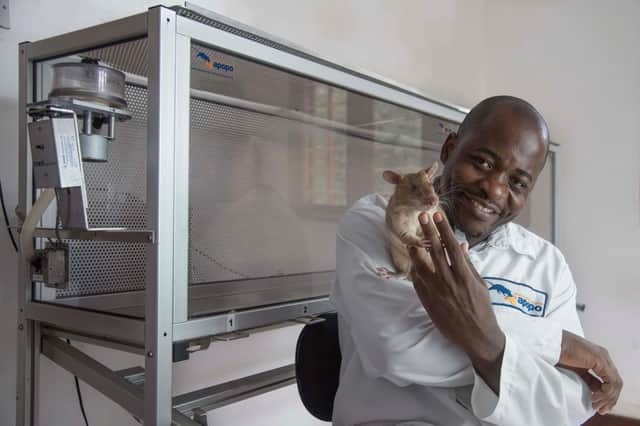Scots scientists train giant ‘sniffer rats’ to detect devasting diseases


Brucellosis causes infertility and low milk yields in livestock and is passed from cows, sheep, goats and pigs to the men and women who farm them with human carriers experiencing flu-like symptoms as well as bone joint and heart problems and and, in rare cases, death.
Hard and expensive to detect, Brucellosis is facing a new weapon being deployed in its wipe out – the African giant pouched rat.
Advertisement
Hide AdAdvertisement
Hide AdMeasuring up to 4ft long, the rats have been shown to be able recruits in the fight against both tuberculosis and landmines, with the rodents able to sniff out properties of both.
Now Glasgow University is pioneering the use of the mammal to sniff out livestock carrying brucellosis with nine rats - camed Hawking, Skinner, Sloth, Stewart, Zhang, Angela, Aung, Jane, and Pipp – being trained in a lab in Tanzania to detect the bacteria.
Professor Dan Haydon, Director of the Institute of Biodiversity, Animal Health and Comparative Medicine at the University of Glasgow, said: “I had been talking with someone who worked in Yellowstone National Park, where they have a brucella problem with elk, bison and cattle, and they use dogs to smell it.
“It was news to me. So, I was describing this somewhat light-heartedly to colleagues and Professor Rudovick Kazwala, who is lead researcher at Sokoine, said, ‘Aha, well, we already have this facility where rats are being specially trained to sniff landmines and tuberculosis’.
“So, we figured if they can smell landmines and smell TB then surely we can get them to smell brucellosis? And the long and the short of it is that it turns out you can.”
The COVID-19 pandemic has highlighted the importance of understanding how infectious diseases in animals can spread to humans.
Professor Haydon added: “Six out of every ten known infectious diseases of humans are estimated to originate from animals. Three-quarters of new or emerging infectious diseases in humans originates from animals, of which COVID-19 represents a particularly devastating example.”
Brucellosis is devastating given the loss of income when infected animals fail to reproduce or produce low amounts of milk.
Advertisement
Hide AdAdvertisement
Hide AdThe World Health Organisation estimates human brucellosis costs at least 264,073 years in terms of disability or early death.
Professor Kazwal, of Sokoine University in Morogoro, Tanzania, who trained rats to sniff out TB, said the animals had an “incredible sense of smell”. Over four to six months, the rats are trained to sniff specimens. When it finds a positive sample, it hears a click and is rewarded with food, with the animal over time learning that smelling brucella leads to a treat.
It is hoped to identify the host species that, when vaccinated, will reduce human infections the most with the rats also to be used to diagnose humans faster.
The scientists received a grant through the FCDO supported Afrique One-ASPIRE initiative for the rat research.
James Duddridge, Minister for Africa, said: “The UK Government is proud to be supporting research that is not only protecting livestock – and farmers’ livelihoods – from debilitating diseases, but potentially increasing our understanding of how diseases mutate to make the leap from animals to humans.”